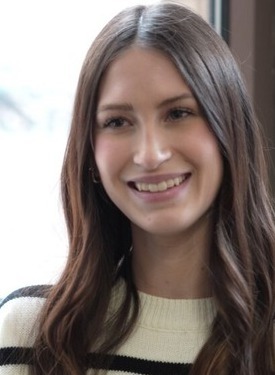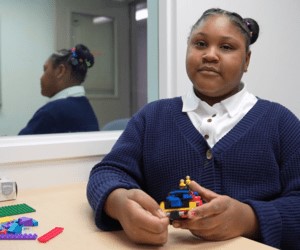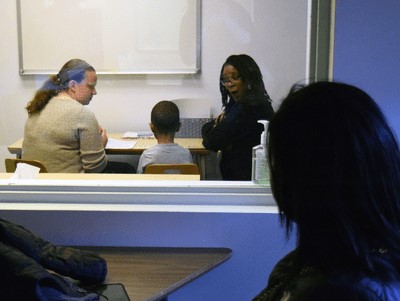Meaningful speech pathology careers start inside Wayne State's Speech and Language Clinics

“Imagine if you couldn’t communicate with anyone,” said Gabriela Madrid, a first-year student in Wayne State University’s Master of Arts in Speech-Language Pathology (SLP) program. “If you couldn’t express your ideas, nothing would be valuable. Communication makes us human.”
Madrid and her fellow students are pursuing a profession whose services are in high demand. According to the United States Bureau of Labor Statistics, there are more than 13,000 job openings annually for speech-language pathologists.

in Speech Language Pathology.
To secure these positions, master’s degrees in speech-language pathology and certifications from the American Speech-Language-Hearing Association are necessary. In Michigan, licensure requires 400 hours of clinical experience. Wayne State helps students obtain these credentials and offers hands-on training through the university’s Speech and Language Clinics.
In addition to building a talented speech-language workforce, Wayne State’s clinics are a community service agency offering high-quality care to clients of all ages. Madrid’s first client in the outpatient clinic was 9-year-old E’Marie Ross-Cummings, who has been deaf since birth, and has visited Wayne State weekly since she received cochlear implants seven years ago.
“As a speech-language pathologist, you get to balance the thrill of science with rewarding human interaction and truly impact people,” said Madrid. “Seeing E’Marie make progress has been so meaningful. Working with her in the clinic has 100% solidified my career choice.”
The young people who visit the clinic also appreciate the student clinicians and their commitment to learning by doing. “I have a lot of fun here, and Gabi was my favorite,” said E’Marie. “We would play Playdoh and Jenga, color, go on scavenger hunts and sing songs.”
A family friend, Cheryl Herba, drives E’Marie to the clinic each week and has observed her sessions. To illustrate how valuable she thought these sessions were to E’Marie, Herba handed Madrid an envelope with a $1,000 check and a letter.
“The work you have been doing with E’Marie over the years has greatly improved her communication skills,” Herba wrote.

“While students come and go, one thing remains consistent: the value you place on providing the best services to meet client needs. Please use the enclosed funds to help offset the cost of items that support clients.”
Clinical Supervisor Kimberly Stewart, M.A. ’07, was moved by the tribute. “We don't ask for recognition, but it was really heartwarming to receive that gift toward new materials,” said Stewart. “It will help us bring in more supplies like Legos and Play-Doh to help young clients more easily engage in their speech activities because practicing speech can be challenging.”
Professional progress
Graduating 80 new speech pathologists per year, the SLP program exemplifies Wayne State’s College to Career initiative, which seeks to provide every student with experiential learning opportunities and prepare for prosperous careers. And as Herba points out, these future SLP graduates are filling a need.
“There are just not enough speech pathologists in the school systems,” Herba said. “I gave to this phenomenal program because we’ve been so fortunate to come here and benefit from it. You can tell the students love what they’re doing.”
As students facilitate speech exercises with their young clients, clinical supervisors observe sessions through a closed-circuit camera system and identify ways to refine their practice.

at the WSU Speech and Language Clinics.
“I have gotten to the point where I enjoy being watched because I know I'm going to get great feedback that will help me be a better student clinician for my clients,” said Madrid. “It’s the best way to learn, even if it feels nerve-racking at first.”
The close attention SLP students receive at Wayne State, in experiences on- and off-campus, has led to excellent results. An assessment of the SLP master's program between 2019-23 found that 100% of graduates had employment within a year of graduation and 98% completed their program on time.
“Wayne State does an amazing job supporting students,” said Madrid. “Professors and clinical supervisors collaborate, so what we learn in the classroom applies in the clinic where our supervisors challenge us to keep improving.”


